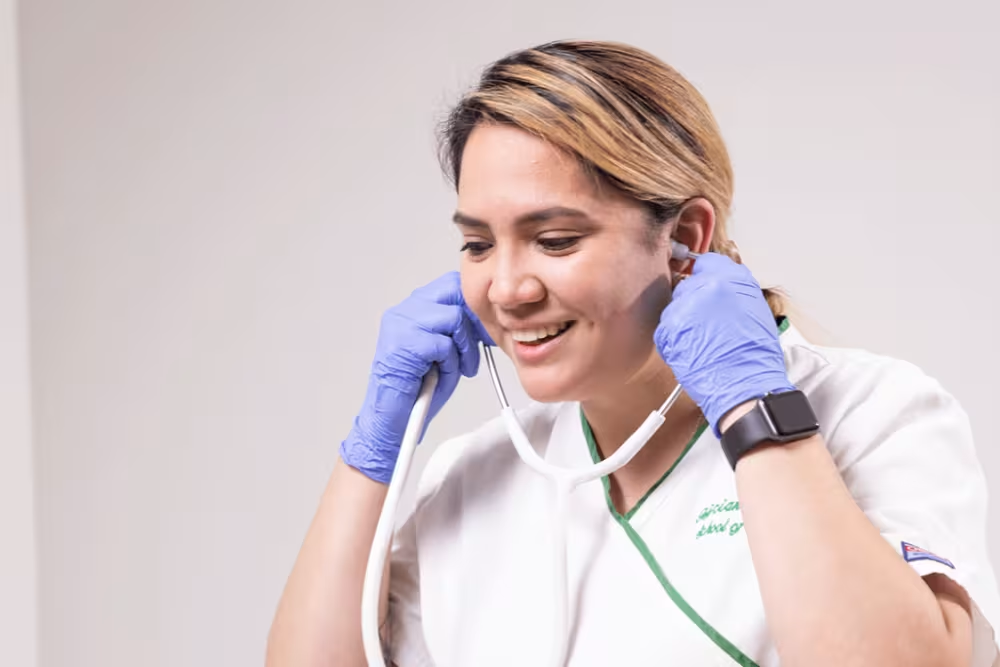What is Autonomy in Nursing and Why Does It Matter?
Each blog post is dated and contains accurate information as of that date. Certain information may have changed since the blog post publication date. If you would like to confirm the current accuracy of blog information, please visit our ABSN overview page or contact admissions at (844) 347-2497.
Autonomy in nursing refers to a nurse’s capability to make patient care decisions within the scope of their practice quickly and is a critical aspect of nursing practice. Healthcare environments that foster autonomy among its nursing staff will experience improved patient outcomes, nursing job satisfaction and efficiency.

Registered nurses (RNs) must have the knowledge and skills necessary to maintain autonomy in their practice, but what is autonomy in nursing? Autonomy in nursing refers to an RN’s ability to make patient care decisions independently, relying on their knowledge and experience to choose the most appropriate course of action.
Nurses must rely on their critical thinking, analytical skills, and education to independently make quick decisions within their scope of practice without direct orders from other members of the healthcare team. Nursing autonomy is critical to improving patients’ care and experiences.
Prospective nurses can enhance their autonomy skills by pursuing a Bachelor of Science in Nursing (BSN). Felician University’s hybrid and on-ground Accelerated Bachelor of Science in Nursing (ABSN) programs strive to prepare students with the education and skills necessary to maintain autonomy in their nursing careers.
Below are examples of autonomy in nursing and the many benefits that come with maintaining autonomy in nursing practice.
10 Examples of Autonomy in Nursing
Registered nurses’ autonomy is limited to the scope of their practice, but nurses still maintain a strong level of independence. Nurses experience two types of autonomy: clinical autonomy and practice autonomy.
Clinical autonomy refers to the independent thinking nurses use when making patient care decisions. Practice autonomy refers to the influence nurses have over their practice’s policy and operations.

1. Assessing Vital Signs and Symptoms
Nurses assess a patient’s vitals upon admittance as part of the patient’s care plan, but occasions may arise when nurses become concerned about a patient’s status.
An example of clinical autonomy is when a nurse acts on this concern and assesses the patient’s vital signs and symptoms without being called to do so. Early intervention can be a critical point in the patient’s care plan and recovery.
2. Delegating Tasks
Delegating tasks to other members of the healthcare team, such as licensed practical nurses (LPNs) and certified nursing assistants (CNAs), is another example of clinical autonomy in nursing.
Nurses who delegate tasks to the appropriate clinicians take the pressure off overwhelmed staff and ensure patients receive quality care to benefit their recovery. Learning how and to whom to delegate tasks is essential to nursing, especially for nurses in leadership positions.

Leadership skills are critical for nurses who want to advance in their careers. Read more to learn about seven essential nursing leadership qualities.
3. Administering PRN Medications
Nurses have clinical autonomy when they administer PRN medications at unscheduled times. PRN medications are administered as needed, such as pain medication.
When a patient experiences pain or discomfort, nurses must use their better judgement to assess the patient’s condition to determine whether administering medication at that time would be beneficial and safe.
4. Educating Patients and Caregivers
Taking the time to educate patients and their caregivers as part of daily nursing duties is another way nurses maintain clinical autonomy. Explaining diagnoses, medications, and treatments to patients and their caregivers can ease their anxiety and prepare them for things to come.
5. Making Decisions in Emergency Situations
Healthcare is a fast-paced industry, especially for nurses working in emergency rooms and other hospital settings. The decisions nurses make during emergencies are another example of clinical autonomy in nursing, such as performing CPR when necessary.
6. Providing Input Regarding Procedure Changes
Providing input regarding procedure changes is one of the ways nurses have practice autonomy. Nurses are on the front line and will experience policy changes first-hand. Healthcare facilities that support nursing autonomy, especially practice autonomy, foster a supportive environment for nurses, ultimately allowing for high-quality patient care.

7. Ensuring Procedures Maintain Code of Ethics
One of the most important examples of autonomy in a nurse’s practice is ensuring procedures—whether old or new—align with nursing’s code of ethics. Nurses must abide by the four principles—autonomy, beneficence, justice, and nonmaleficence. An environment that promotes autonomy in nursing allows nurses to speak up when procedures contradict the code of ethics.
8. Assisting the Healthcare Team When Necessary
Assisting the healthcare team when necessary is another way nurses maintain autonomy in their practice. The ability to step away from certain duties to assist their colleagues improves the bonds between colleagues and the quality of patient care.
An environment that does not allow room for practice autonomy can lead to exhausted nurses making mistakes. Assisting others will ultimately diminish burnout among the nursing staff and foster a helpful and productive environment.
9. Suggesting Organizational Changes
Practice autonomy enables nurses to provide input on organizational decisions and operations. For example, nurses show autonomy in their practice when they suggest restocking certain supplies or organizational changes in the supply room.
Nurses consistently work with these supplies and have an invaluable perspective on the most essential items. The same applies to other organizational decisions nurses make daily. This type of input from nurses ensures that patient care is not lacking and that the healthcare facility remains efficient.
10. Maintaining Control Over Work Conditions

Nurses can exercise practice autonomy over their work conditions by providing them with flexibility over their working hours. Utilizing a full-time working hour selection system, providing nurses with flexibility in choosing their vacation days, and allowing nurses to choose day or night shifts, promotes autonomy over their working conditions.
Benefits of Autonomy in Nursing
Now that you know the answer to “What is autonomy in nursing?”, it is important to understand the many benefits of promoting autonomy in a healthcare facility. Autonomy in nursing allows nurses to rely on their education and experience to provide high-quality care.
A 2017 study revealed a correlation between increased autonomy in a hospital setting and a decrease in the odds of 30-day mortality and failure to rescue (FTR) in surgical patients. Ultimately, the study concluded that lower levels of nurse autonomy in hospitals potentially put patients at increased risk.
Increased nurse job satisfaction is also one of the important benefits of autonomy in nursing. Autonomy in nursing allows nurses to perform their job to the best of their ability and make their voices heard in their practice.

Are you ready to begin your nursing education journey? Read more to learn the impact a BSN education has on a nursing career.
How to Enhance Your Autonomy with Felician University
Through either Felician University’s online-based ABSN or on-ground ABSN, students can earn their BSN in as few as 16 to 18 months, depending on their program of choice. Students with a non-nursing bachelor’s degree from a regionally accredited institution or at least 60 undergraduate credits can apply, provided they meet the additional admissions requirements.

Students acquire the knowledge and skills necessary to enhance their autonomy for their future careers through on-ground or online coursework, on-ground skills and nursing simulation labs, and clinical rotations.
Felician’s ABSN instills the confidence, experience, ethics, communication, and leadership skills necessary for nurses to work autonomously in a healthcare facility, providing high-quality and dignified patient care. Upon graduation, students can answer the question, “What is autonomy in nursing?” and are equipped to make sound patient care decisions and valuable practice suggestions.
Contact an admissions counselor today to learn about our ABSN programs and take the first steps toward becoming a registered nurse.
